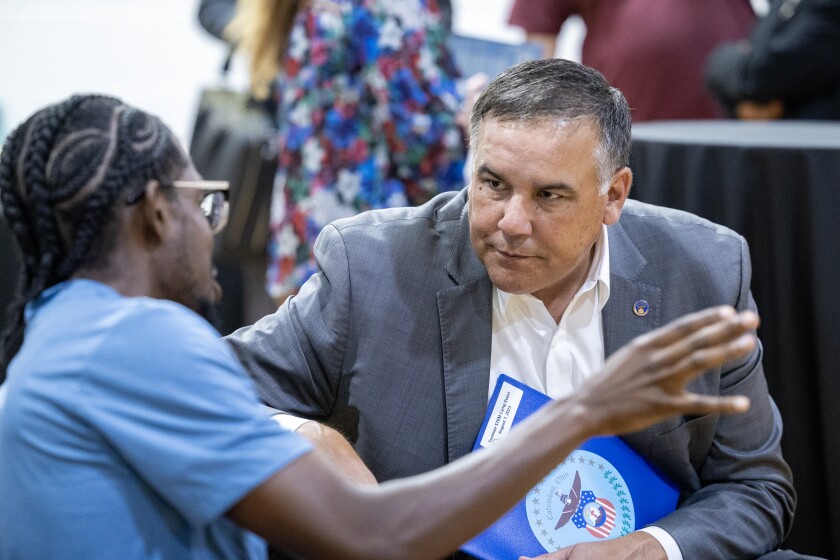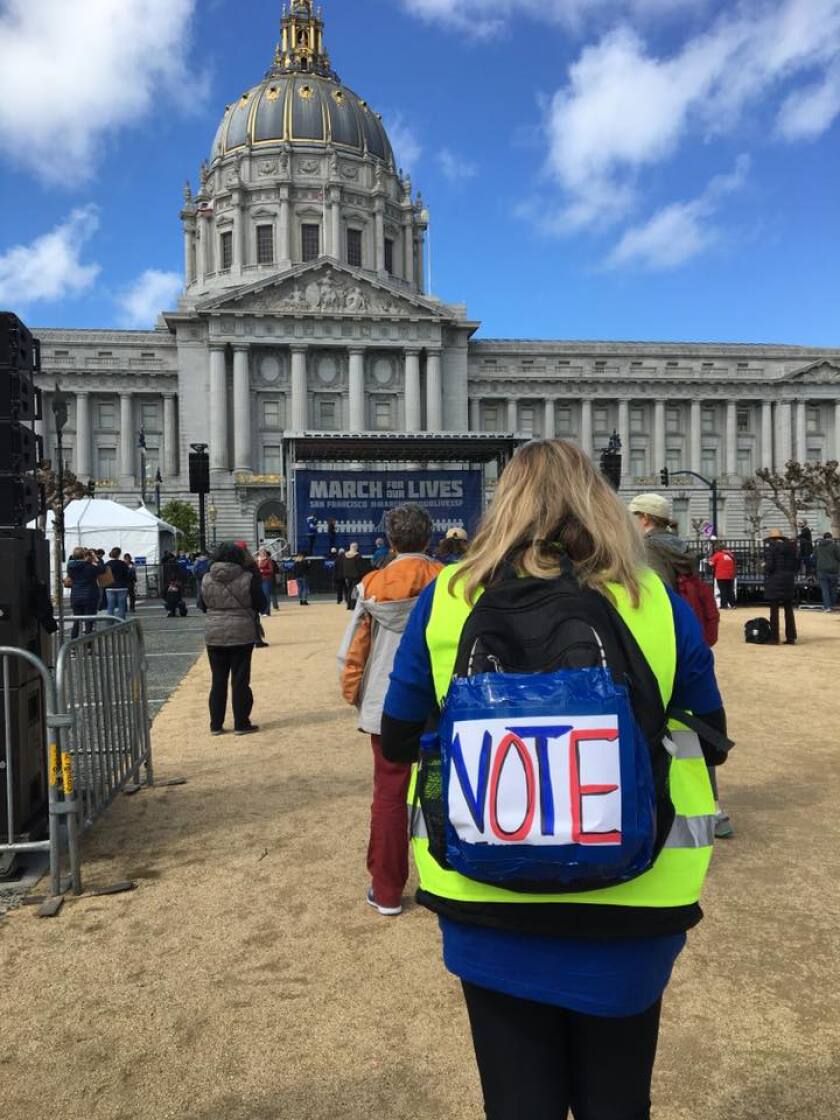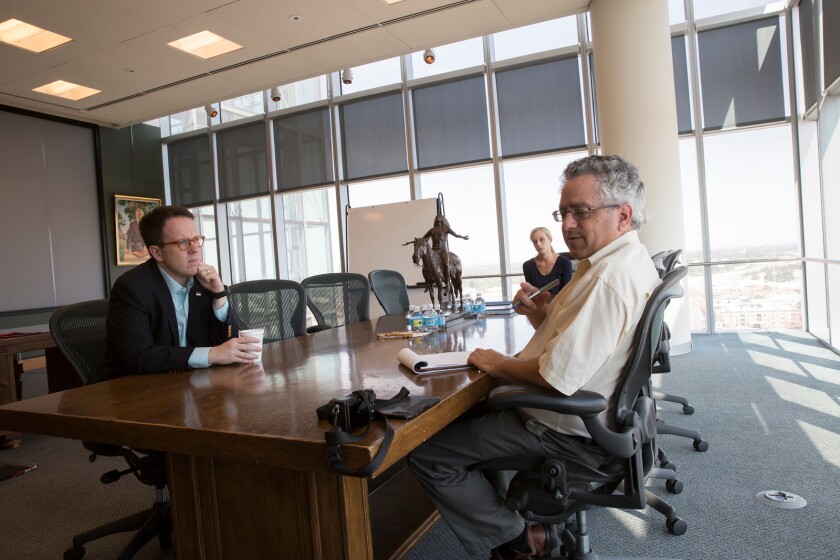It’s been more than 30 years since I published my first professional piece about politics. I thought I’d reflect on a few lessons I’ve learned along the way.
Politicians Are Not Hacks: It takes a certain level of ego to run for office and there’s more corruption taking place in government than we’ll ever know about. Having said that, after interviewing many hundreds if not thousands of politicians, I’ll say with confidence that they are almost universally well-informed and in most cases thoughtful to boot.
Essentially every politician knows everything about his constituency — who’s hiring, which bus routes are sketchy, every event on the school and social club calendars, how all this stitches together. In terms of policy, they have more depth of knowledge than they’re usually credited for.

(David Kidd/Governing)
Most Voters Don't Obsess About Politics: If you walk up to people at parades or diners, you'll find they aren't paying as much attention to politics as you, the political reporter on the prowl, might think. Some of this is through choice. Many people have no interest in politics and pay no more attention to it than I give to sports. It’s like telling a friend she should watch Hacks and having her say, “I don’t get HBO.”
But there’s a deeper disconnect. From my first trips traveling around with a notebook, I was struck that while those of us in Washington “knew” a House race in Delaware or Indiana was about health costs or unemployment, voters on the ground raised totally different concerns. Often it was whether a local politician seemed to be enriching himself or there’d been some scandal involving something they really cared about, like sex.
The debate that’s been happening in Washington around the shutdown — whether voters will blame Democrats for refusing to support a “clean CR” in their fight for health spending or Republicans because they’re in charge — is ludicrous. I promise you that 95 percent of Americans, at least, have no idea about these kinds of arguments behind the impasse. There’s a reason poll results vary so much depending on how questions are phrased; this may be the only information respondents have about specifics.

(Alan Greenblatt/Governing)
A month ago, I went to talk to voters in a Missouri county that gave President Donald Trump 82 percent of its vote last year. Unsurprisingly, residents seem happy with his performance but what was striking was the almost complete lack of specificity in their descriptions of what he's been up to during his highly active term back in power so far. That's been the norm, in my experience. For whatever reason, people are not as tuned into politics as those of us who cover it for a living would expect.
There’s more than abundant coverage of Trump but try finding out votable details about your local candidates for county executive. It’s tough even when you’re making a conscious effort. Politicians aren’t helping in this regard, increasingly making it their policy not to talk to reporters — or, putting it another way, choosing not to talk to the people through news outlets.
It Pays to Pay Attention: I have heard people say many times that politics doesn’t concern them. Politicians don’t care what people like them think and nothing ever seems to change anyway. Fewer than half adult Americans vote in most elections, although the presidential years of 2020 and 2024 saw turnout above 60 percent for the first time in decades.
I have news for those who are disinterested: They might not care about politics but politics is going to affect them anyway. One of the state-the-obvious cliches of our day is that “elections have consequences,” but it’s true. Programs people rely on could get slashed. Their children might be sent to war. They may not have cast a vote but that does not make government disappear.
People love to complain about lobbyists and “special interests,” but guess what: Lobbying matters. Money makes a big difference but ordinary people banding together can sway lawmakers. Seniors get huge amounts of support from the federal government and kids get practically nothing because seniors vote and have an active lobby and there’s barely an organized push to support children. There’s a reason the National Rifle Association, during its heyday, was routinely able to kill gun control legislation that seemed to have broad support. Politicians have clinical-grade fear of losing elections and they’ll listen to people who make their case loudly and persistently enough.

(Alan Greenblatt/Governing)
Not only the Kennedys but most people in government seem wary about talking to the press. And I get that. I’m not going to pretend reporters have never bent quotes or their context to serve a narrative purpose. Still, governments, for the most part, are failures not only at responding to the media but more importantly, highlighting what they do. Sure, they put out press releases, but unlike private-sector companies they are seemingly incapable of highlighting which of their “products” or services are performing really well.
Hypocrisy Is a Dumb Charge: Reporters love to point out when politicians are being hypocrites. It’s a free shot. It’s not ideological so it’s fair to say, “you said this but now you’re saying the opposite,” like a whiny child complaining that Mom has changed her mind about a trip to McDonald’s.
It can be useful to note when a politician has changed her tune but usually hypocrisy “gotchas” involve a simple misunderstanding of a golden rule of government: Namely, where you stand depends on where you sit. Naturally, Democrats are going to complain about not being able to offer amendments on the House floor when Republicans are in charge, even though the reverse dynamic played out when Democrats were in control. Minority parties always and without fail complain about ill treatment including and maybe especially when it involves tactics they used themselves in power. That’s their job.
Of course Mitch McConnell, the former Senate Republican leader, was not stating some high-minded principle in 2016 when he refused to consider President Barack Obama’s Supreme Court nominee in the last year of his term, even though McConnell framed his obstruction using the argument that it was too late and voters should have a say. He wasn’t suddenly “caught” changing his mind when Trump nominated Amy Coney Barrett and the Senate confirmed her about a week before the 2020 election. It was all about the raw exercise of power, both times.
Reporters should call out things like that, not couch them in faux-shocked language about hypocrisy. They should stop pretending they’re enforcing a set of rules of decorum governing political combat. Instead, they should inform readers and viewers and doomscrollers about what’s going on, and why.
Well, there are more things I could say but if there’s one thing I’ve learned in all these years it’s to leave readers wanting more. I’ve seldom succeeded at that but I won’t overstay my welcome this time.

(David Kidd/Governing)









